Trends in Global Business Environment: Data-Driven Approach Analysis
VerifiedAdded on 2019/09/30
|7
|1397
|282
Report
AI Summary
This report examines the trends in the global business environment, with a specific focus on the adoption and impact of data-driven approaches. It highlights the critical role of data and analytics in modern business strategies, emphasizing how organizations use data as a key asset to adapt and modify their strategies. The report analyzes the challenges organizations face when embracing a data-driven approach, including the lack of data orientation, underutilization of IT applications, and the failure to recognize data as a source of competitive advantage. It presents statistics on the increasing investments in big data and artificial intelligence (AI), the growing importance of data management, and the challenges related to skilled workforce and cultural changes. The research also discusses the need for technology upgrades, skilled professionals, and organizational collaboration to effectively use data analytics. The report concludes that the lack of resources and essential adjustments in organizational culture significantly affect the success of data-driven approaches, and it recommends that businesses identify and develop talents to use big data and AI effectively and make necessary cultural changes.

Trends in Global Business Environment
1
1
Paraphrase This Document
Need a fresh take? Get an instant paraphrase of this document with our AI Paraphraser

Table of Contents
Introduction......................................................................................................................................3
Body.................................................................................................................................................3
General.............................................................................................................................................4
Discussion........................................................................................................................................5
Conclusion.......................................................................................................................................6
2
Introduction......................................................................................................................................3
Body.................................................................................................................................................3
General.............................................................................................................................................4
Discussion........................................................................................................................................5
Conclusion.......................................................................................................................................6
2
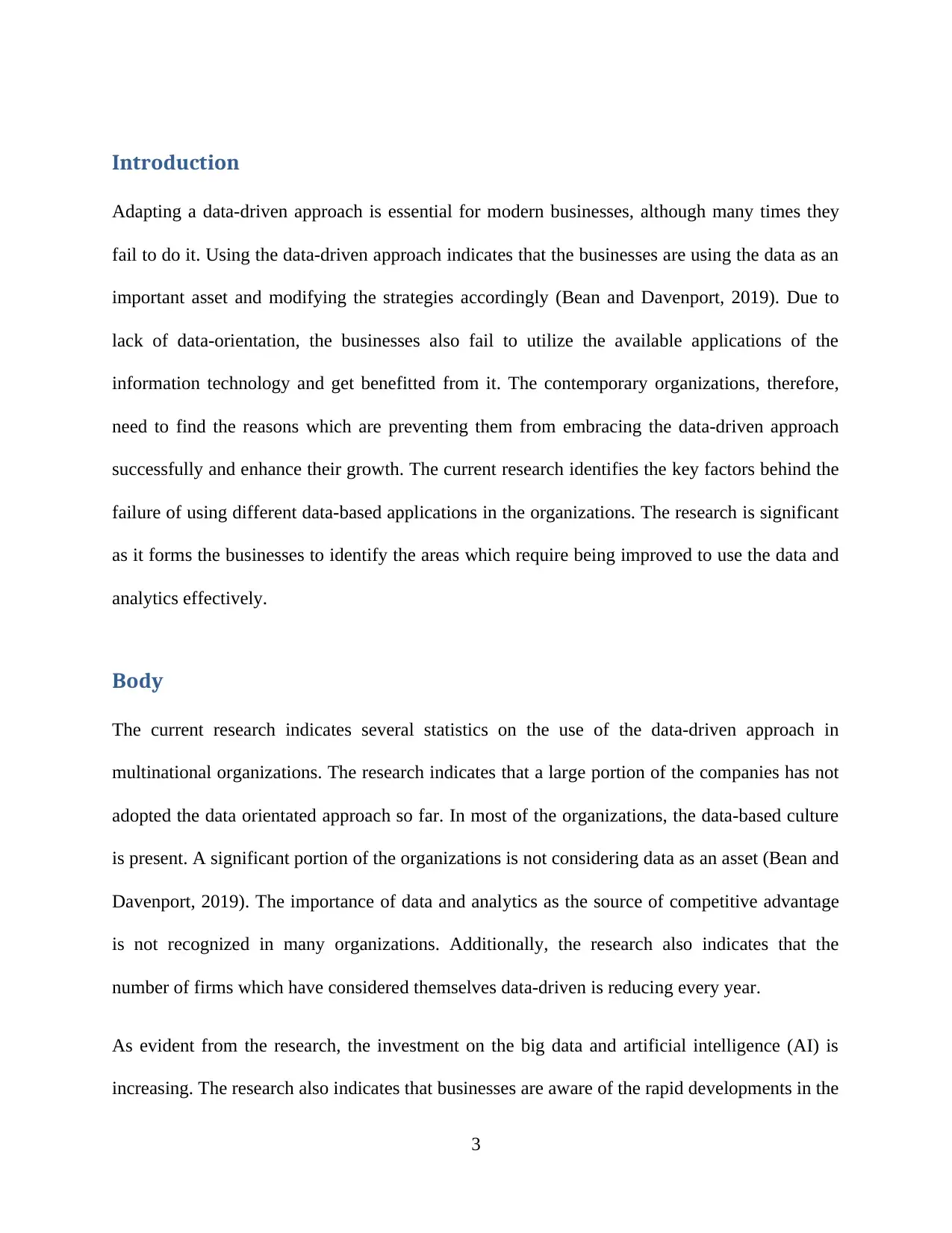
Introduction
Adapting a data-driven approach is essential for modern businesses, although many times they
fail to do it. Using the data-driven approach indicates that the businesses are using the data as an
important asset and modifying the strategies accordingly (Bean and Davenport, 2019). Due to
lack of data-orientation, the businesses also fail to utilize the available applications of the
information technology and get benefitted from it. The contemporary organizations, therefore,
need to find the reasons which are preventing them from embracing the data-driven approach
successfully and enhance their growth. The current research identifies the key factors behind the
failure of using different data-based applications in the organizations. The research is significant
as it forms the businesses to identify the areas which require being improved to use the data and
analytics effectively.
Body
The current research indicates several statistics on the use of the data-driven approach in
multinational organizations. The research indicates that a large portion of the companies has not
adopted the data orientated approach so far. In most of the organizations, the data-based culture
is present. A significant portion of the organizations is not considering data as an asset (Bean and
Davenport, 2019). The importance of data and analytics as the source of competitive advantage
is not recognized in many organizations. Additionally, the research also indicates that the
number of firms which have considered themselves data-driven is reducing every year.
As evident from the research, the investment on the big data and artificial intelligence (AI) is
increasing. The research also indicates that businesses are aware of the rapid developments in the
3
Adapting a data-driven approach is essential for modern businesses, although many times they
fail to do it. Using the data-driven approach indicates that the businesses are using the data as an
important asset and modifying the strategies accordingly (Bean and Davenport, 2019). Due to
lack of data-orientation, the businesses also fail to utilize the available applications of the
information technology and get benefitted from it. The contemporary organizations, therefore,
need to find the reasons which are preventing them from embracing the data-driven approach
successfully and enhance their growth. The current research identifies the key factors behind the
failure of using different data-based applications in the organizations. The research is significant
as it forms the businesses to identify the areas which require being improved to use the data and
analytics effectively.
Body
The current research indicates several statistics on the use of the data-driven approach in
multinational organizations. The research indicates that a large portion of the companies has not
adopted the data orientated approach so far. In most of the organizations, the data-based culture
is present. A significant portion of the organizations is not considering data as an asset (Bean and
Davenport, 2019). The importance of data and analytics as the source of competitive advantage
is not recognized in many organizations. Additionally, the research also indicates that the
number of firms which have considered themselves data-driven is reducing every year.
As evident from the research, the investment on the big data and artificial intelligence (AI) is
increasing. The research also indicates that businesses are aware of the rapid developments in the
3
⊘ This is a preview!⊘
Do you want full access?
Subscribe today to unlock all pages.

Trusted by 1+ million students worldwide
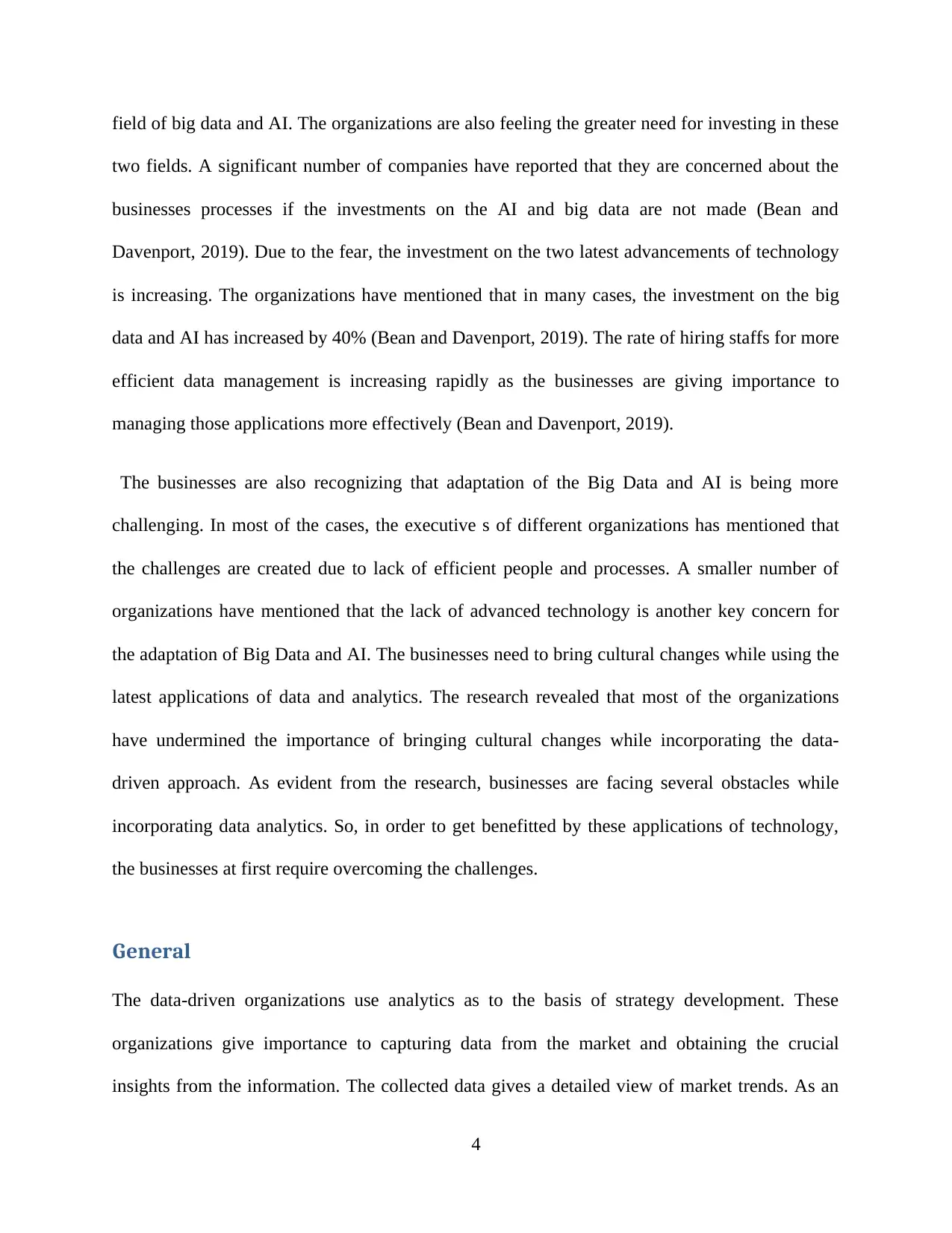
field of big data and AI. The organizations are also feeling the greater need for investing in these
two fields. A significant number of companies have reported that they are concerned about the
businesses processes if the investments on the AI and big data are not made (Bean and
Davenport, 2019). Due to the fear, the investment on the two latest advancements of technology
is increasing. The organizations have mentioned that in many cases, the investment on the big
data and AI has increased by 40% (Bean and Davenport, 2019). The rate of hiring staffs for more
efficient data management is increasing rapidly as the businesses are giving importance to
managing those applications more effectively (Bean and Davenport, 2019).
The businesses are also recognizing that adaptation of the Big Data and AI is being more
challenging. In most of the cases, the executive s of different organizations has mentioned that
the challenges are created due to lack of efficient people and processes. A smaller number of
organizations have mentioned that the lack of advanced technology is another key concern for
the adaptation of Big Data and AI. The businesses need to bring cultural changes while using the
latest applications of data and analytics. The research revealed that most of the organizations
have undermined the importance of bringing cultural changes while incorporating the data-
driven approach. As evident from the research, businesses are facing several obstacles while
incorporating data analytics. So, in order to get benefitted by these applications of technology,
the businesses at first require overcoming the challenges.
General
The data-driven organizations use analytics as to the basis of strategy development. These
organizations give importance to capturing data from the market and obtaining the crucial
insights from the information. The collected data gives a detailed view of market trends. As an
4
two fields. A significant number of companies have reported that they are concerned about the
businesses processes if the investments on the AI and big data are not made (Bean and
Davenport, 2019). Due to the fear, the investment on the two latest advancements of technology
is increasing. The organizations have mentioned that in many cases, the investment on the big
data and AI has increased by 40% (Bean and Davenport, 2019). The rate of hiring staffs for more
efficient data management is increasing rapidly as the businesses are giving importance to
managing those applications more effectively (Bean and Davenport, 2019).
The businesses are also recognizing that adaptation of the Big Data and AI is being more
challenging. In most of the cases, the executive s of different organizations has mentioned that
the challenges are created due to lack of efficient people and processes. A smaller number of
organizations have mentioned that the lack of advanced technology is another key concern for
the adaptation of Big Data and AI. The businesses need to bring cultural changes while using the
latest applications of data and analytics. The research revealed that most of the organizations
have undermined the importance of bringing cultural changes while incorporating the data-
driven approach. As evident from the research, businesses are facing several obstacles while
incorporating data analytics. So, in order to get benefitted by these applications of technology,
the businesses at first require overcoming the challenges.
General
The data-driven organizations use analytics as to the basis of strategy development. These
organizations give importance to capturing data from the market and obtaining the crucial
insights from the information. The collected data gives a detailed view of market trends. As an
4
Paraphrase This Document
Need a fresh take? Get an instant paraphrase of this document with our AI Paraphraser
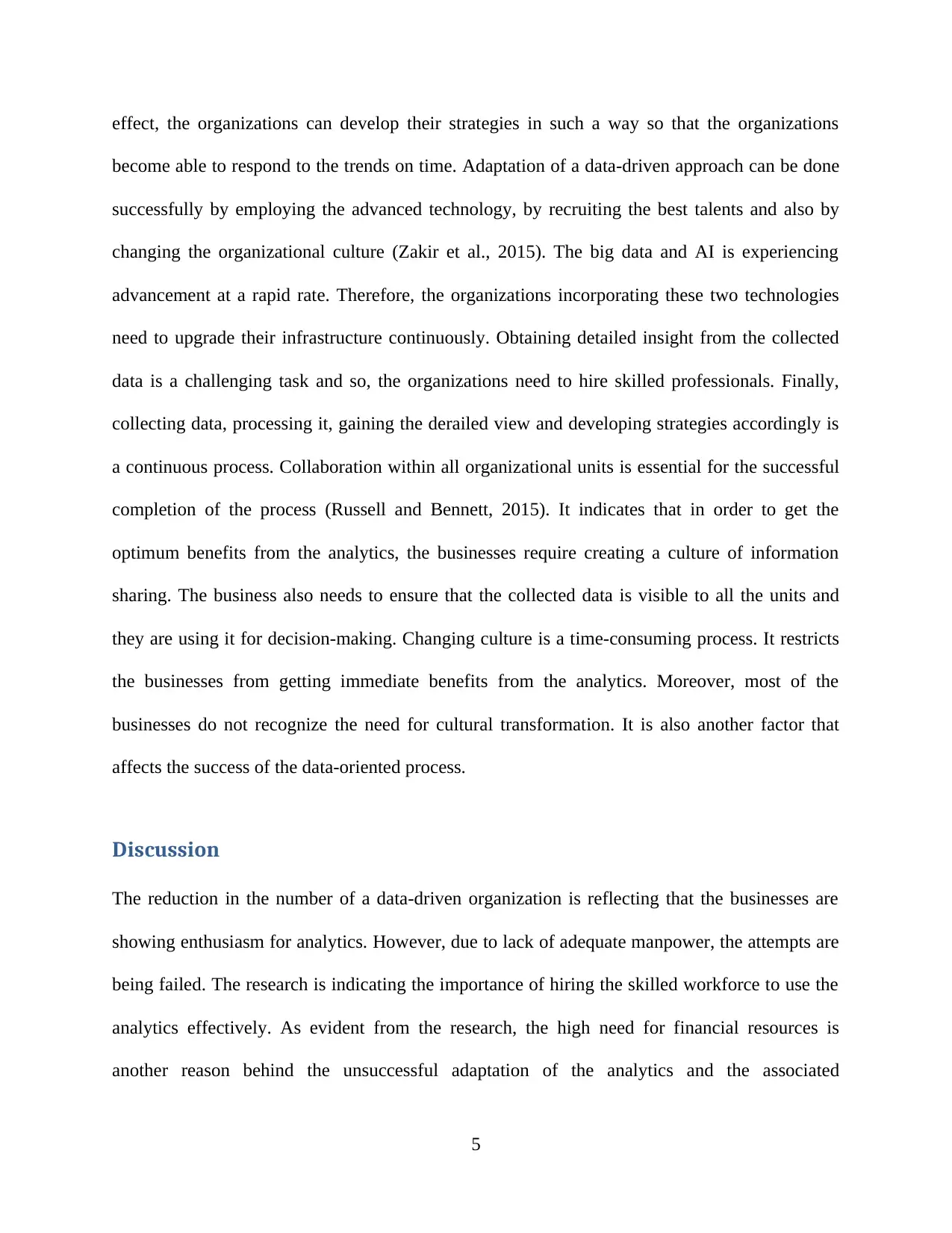
effect, the organizations can develop their strategies in such a way so that the organizations
become able to respond to the trends on time. Adaptation of a data-driven approach can be done
successfully by employing the advanced technology, by recruiting the best talents and also by
changing the organizational culture (Zakir et al., 2015). The big data and AI is experiencing
advancement at a rapid rate. Therefore, the organizations incorporating these two technologies
need to upgrade their infrastructure continuously. Obtaining detailed insight from the collected
data is a challenging task and so, the organizations need to hire skilled professionals. Finally,
collecting data, processing it, gaining the derailed view and developing strategies accordingly is
a continuous process. Collaboration within all organizational units is essential for the successful
completion of the process (Russell and Bennett, 2015). It indicates that in order to get the
optimum benefits from the analytics, the businesses require creating a culture of information
sharing. The business also needs to ensure that the collected data is visible to all the units and
they are using it for decision-making. Changing culture is a time-consuming process. It restricts
the businesses from getting immediate benefits from the analytics. Moreover, most of the
businesses do not recognize the need for cultural transformation. It is also another factor that
affects the success of the data-oriented process.
Discussion
The reduction in the number of a data-driven organization is reflecting that the businesses are
showing enthusiasm for analytics. However, due to lack of adequate manpower, the attempts are
being failed. The research is indicating the importance of hiring the skilled workforce to use the
analytics effectively. As evident from the research, the high need for financial resources is
another reason behind the unsuccessful adaptation of the analytics and the associated
5
become able to respond to the trends on time. Adaptation of a data-driven approach can be done
successfully by employing the advanced technology, by recruiting the best talents and also by
changing the organizational culture (Zakir et al., 2015). The big data and AI is experiencing
advancement at a rapid rate. Therefore, the organizations incorporating these two technologies
need to upgrade their infrastructure continuously. Obtaining detailed insight from the collected
data is a challenging task and so, the organizations need to hire skilled professionals. Finally,
collecting data, processing it, gaining the derailed view and developing strategies accordingly is
a continuous process. Collaboration within all organizational units is essential for the successful
completion of the process (Russell and Bennett, 2015). It indicates that in order to get the
optimum benefits from the analytics, the businesses require creating a culture of information
sharing. The business also needs to ensure that the collected data is visible to all the units and
they are using it for decision-making. Changing culture is a time-consuming process. It restricts
the businesses from getting immediate benefits from the analytics. Moreover, most of the
businesses do not recognize the need for cultural transformation. It is also another factor that
affects the success of the data-oriented process.
Discussion
The reduction in the number of a data-driven organization is reflecting that the businesses are
showing enthusiasm for analytics. However, due to lack of adequate manpower, the attempts are
being failed. The research is indicating the importance of hiring the skilled workforce to use the
analytics effectively. As evident from the research, the high need for financial resources is
another reason behind the unsuccessful adaptation of the analytics and the associated
5
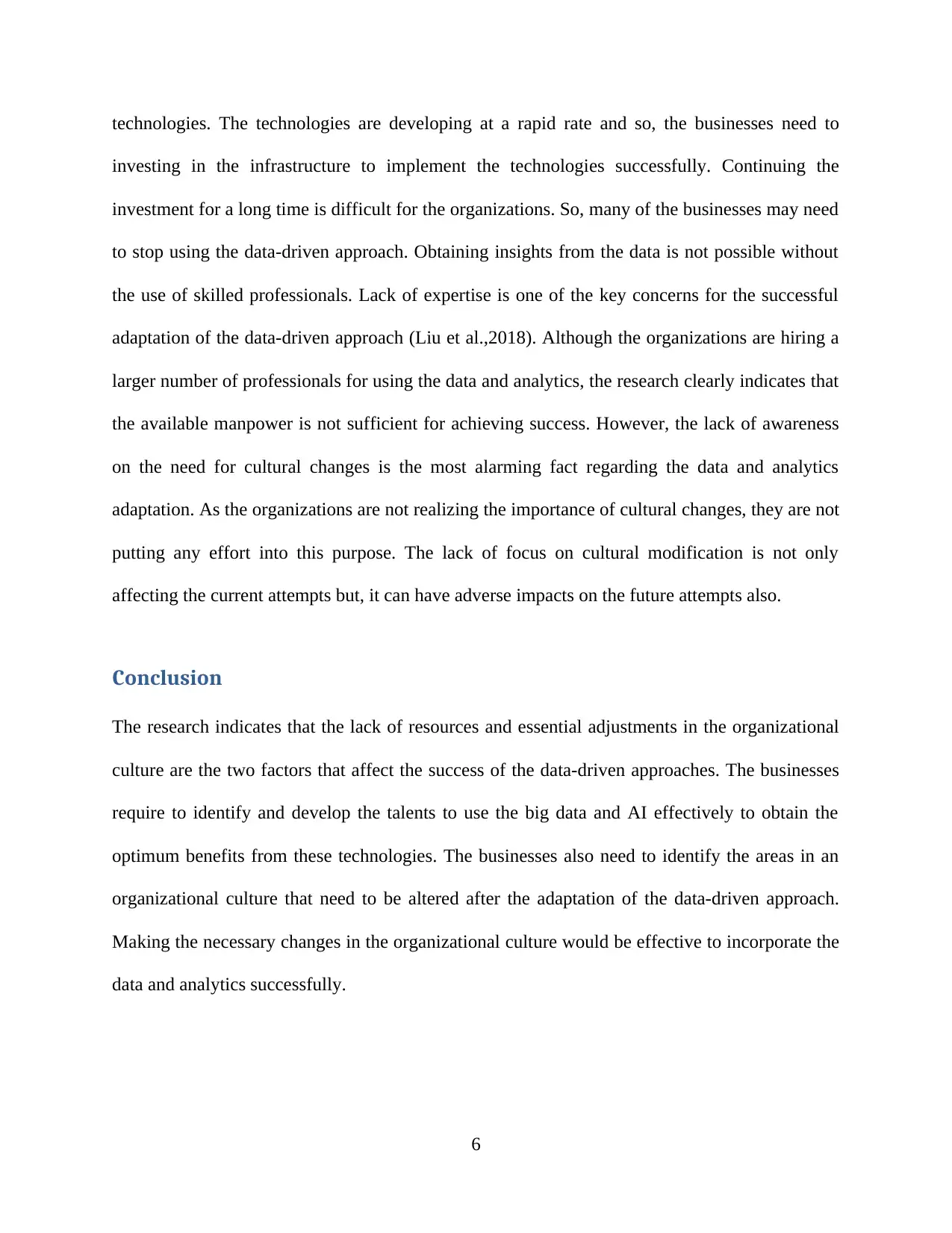
technologies. The technologies are developing at a rapid rate and so, the businesses need to
investing in the infrastructure to implement the technologies successfully. Continuing the
investment for a long time is difficult for the organizations. So, many of the businesses may need
to stop using the data-driven approach. Obtaining insights from the data is not possible without
the use of skilled professionals. Lack of expertise is one of the key concerns for the successful
adaptation of the data-driven approach (Liu et al.,2018). Although the organizations are hiring a
larger number of professionals for using the data and analytics, the research clearly indicates that
the available manpower is not sufficient for achieving success. However, the lack of awareness
on the need for cultural changes is the most alarming fact regarding the data and analytics
adaptation. As the organizations are not realizing the importance of cultural changes, they are not
putting any effort into this purpose. The lack of focus on cultural modification is not only
affecting the current attempts but, it can have adverse impacts on the future attempts also.
Conclusion
The research indicates that the lack of resources and essential adjustments in the organizational
culture are the two factors that affect the success of the data-driven approaches. The businesses
require to identify and develop the talents to use the big data and AI effectively to obtain the
optimum benefits from these technologies. The businesses also need to identify the areas in an
organizational culture that need to be altered after the adaptation of the data-driven approach.
Making the necessary changes in the organizational culture would be effective to incorporate the
data and analytics successfully.
6
investing in the infrastructure to implement the technologies successfully. Continuing the
investment for a long time is difficult for the organizations. So, many of the businesses may need
to stop using the data-driven approach. Obtaining insights from the data is not possible without
the use of skilled professionals. Lack of expertise is one of the key concerns for the successful
adaptation of the data-driven approach (Liu et al.,2018). Although the organizations are hiring a
larger number of professionals for using the data and analytics, the research clearly indicates that
the available manpower is not sufficient for achieving success. However, the lack of awareness
on the need for cultural changes is the most alarming fact regarding the data and analytics
adaptation. As the organizations are not realizing the importance of cultural changes, they are not
putting any effort into this purpose. The lack of focus on cultural modification is not only
affecting the current attempts but, it can have adverse impacts on the future attempts also.
Conclusion
The research indicates that the lack of resources and essential adjustments in the organizational
culture are the two factors that affect the success of the data-driven approaches. The businesses
require to identify and develop the talents to use the big data and AI effectively to obtain the
optimum benefits from these technologies. The businesses also need to identify the areas in an
organizational culture that need to be altered after the adaptation of the data-driven approach.
Making the necessary changes in the organizational culture would be effective to incorporate the
data and analytics successfully.
6
⊘ This is a preview!⊘
Do you want full access?
Subscribe today to unlock all pages.

Trusted by 1+ million students worldwide
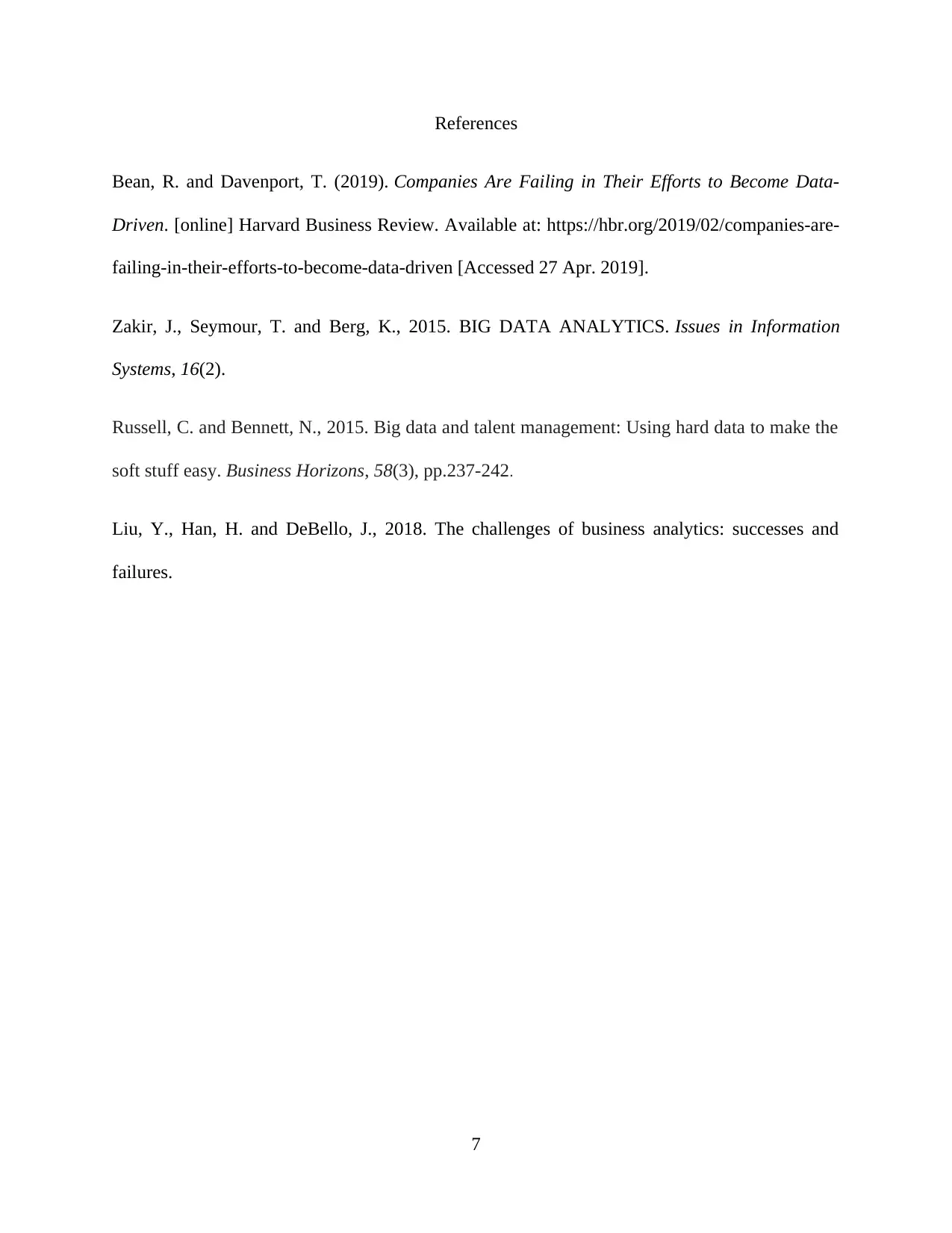
References
Bean, R. and Davenport, T. (2019). Companies Are Failing in Their Efforts to Become Data-
Driven. [online] Harvard Business Review. Available at: https://hbr.org/2019/02/companies-are-
failing-in-their-efforts-to-become-data-driven [Accessed 27 Apr. 2019].
Zakir, J., Seymour, T. and Berg, K., 2015. BIG DATA ANALYTICS. Issues in Information
Systems, 16(2).
Russell, C. and Bennett, N., 2015. Big data and talent management: Using hard data to make the
soft stuff easy. Business Horizons, 58(3), pp.237-242.
Liu, Y., Han, H. and DeBello, J., 2018. The challenges of business analytics: successes and
failures.
7
Bean, R. and Davenport, T. (2019). Companies Are Failing in Their Efforts to Become Data-
Driven. [online] Harvard Business Review. Available at: https://hbr.org/2019/02/companies-are-
failing-in-their-efforts-to-become-data-driven [Accessed 27 Apr. 2019].
Zakir, J., Seymour, T. and Berg, K., 2015. BIG DATA ANALYTICS. Issues in Information
Systems, 16(2).
Russell, C. and Bennett, N., 2015. Big data and talent management: Using hard data to make the
soft stuff easy. Business Horizons, 58(3), pp.237-242.
Liu, Y., Han, H. and DeBello, J., 2018. The challenges of business analytics: successes and
failures.
7
1 out of 7
Related Documents
Your All-in-One AI-Powered Toolkit for Academic Success.
+13062052269
info@desklib.com
Available 24*7 on WhatsApp / Email
![[object Object]](/_next/static/media/star-bottom.7253800d.svg)
Unlock your academic potential
Copyright © 2020–2026 A2Z Services. All Rights Reserved. Developed and managed by ZUCOL.



